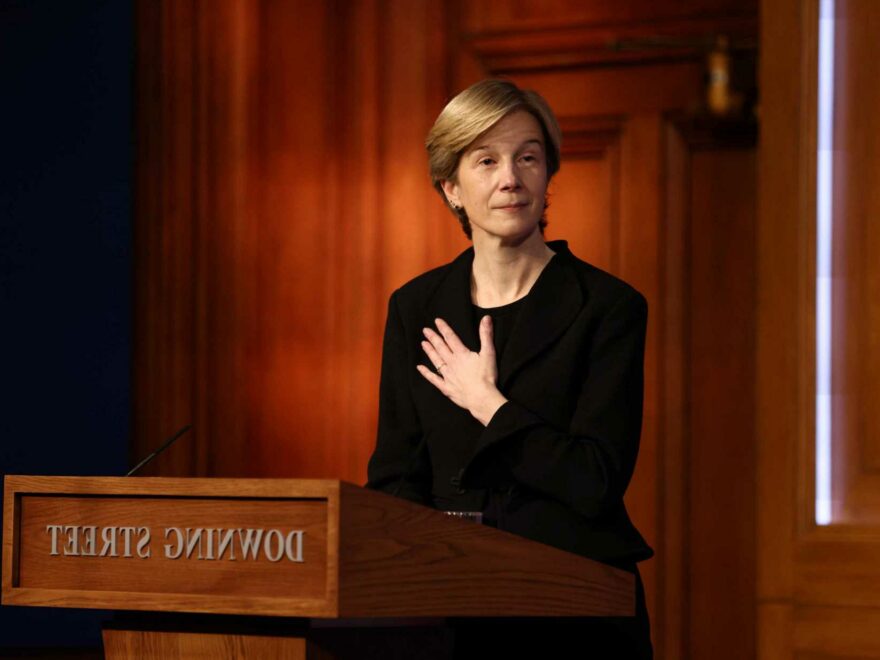THE most vulnerable in the country are set to get four coronavirus jabs in a race to stop the spread of the Omicron variant, an NHS chief has revealed.
It comes as more cases of Omicron were today detected in the UK – now totalling 22.
NHS England's chief executive, Amanda Pritchard, today said that millions more people are eligible for boosters.
Speaking at a Downing Street press conference this afternoon she said that the NHS would be following new advise from the Joint Committee on Vaccination and Immunisation (JCVI).
She said: "The NHS Covid programme is in its most complex phase and is working at brake neck speed at this change in eligibility.
"The JCVI has also recommended the introduction of a fourth jab for the most vulnerable, because they are undergoing chemotherapy or are having other problems with their immune system.
"We will vaccinate the most vulnerable first and then open it up in other waves."
It was yesterday revealed that people aged 18-39 would be eligible for Covid booster jabs but that the vulnerable would still be first in line.
Those who can currently book through the national booking service include those who are 40 years old and over and those who have a health condition which means they need to be vaccinated first.
Pritchard urged those in younger age groups to wait until the NHS contacts them until coming forward for their jabs.
It is also thought that those having a fourth jab will be contacted by their healthcare provider when they are set for their fourth dose.
She said she has today written to the NHS setting out the steps needed to be taken so the programme can move forward.
Pritchard said that capacity would need to be expanded across the whole of the NHS.
"Hundreds of hospitals are already jabbing their own staff. We're now asking them to vaccinate other local NHS workers, eligible patients and social care staff as well.
"Around 30 hospitals are already offering jabs to the public through the national booking service and dozens more will be coming online through early next week.
"Our hard-working GPs, community pharmacists and primary care colleagues have delivered the lion's share of the vaccinations so far. We're looking at how we can help them to do even more by cutting other burdens on them to free up clinicians' time."
Cash for jabs
In order to 'reward' hard working staff for the jabs rollout, Pritchard said a cash incentive would be implemented.
She explained that GPs and pharmacies would be offered £15 per jab until the end of January, with an extra £5 for those administered on a Sunday and a £30 premium for those delivered to the housebound until the end of next month.
This, she said, is to make sure as many jabs as possible are being delivered.
Prime Minister Boris Johnson also this afternoon revealed that the army, along with pop up sites would also be rolled out to help save Christmas amid the uncertainty of the Omicron variant.
He did however admit that he couldn't rule out a fresh lockdown, but said tough restrictions were 'unlikely'.
How many doses do I need?
Vulnerable had previously expressed their confusion around third jabs, booster jabs and fourth doses.
For some patients, a third dose of the coronavirus vaccine should come before their booster.
This applies to people who are severely immunosuppressed – in short – close to half a million Brits.
People in this category have weakened immune systems and some have lower levels of antibodies after their coronavirus jabs.
The third dose is given as a 'top up' for those who might not have generated a good enough immune response to the first two doses.
This includes people who have cancer, advanced HIV and had a recent organ transplant – but is not the full shielding list that was introduced during lockdowns.
The Joint Committee on Vaccination and Immunisation (JCVI) said in September that a third dose should have been offered to people who were in this category at the time of their first or second dose.
They explained: "These people may not mount a full response to vaccination and therefore may be less protected than the wider population.
"This offer is separate to any potential booster programme."
People having a third dose should have it around eight weeks after their second – before a booster vaccine.
Professor Wei Shen Lim, Chair of Covid-19 Immunisation for the JCVI said that people in this group would have a third dose on top of their initial two doses, in the hope that this would reduce their risk of severe outcomes such as hospitalisations and death.
We pay for your stories!
Do you have a story for The Sun news desk?
Email us at [email protected] or call 0207 782 4104. You can WhatsApp us on 07423 720 250. We pay for videos too.
Click here to upload yours.
Click here to get The Sun newspaper delivered for FREE for the next six weeks.
Source: Read Full Article

